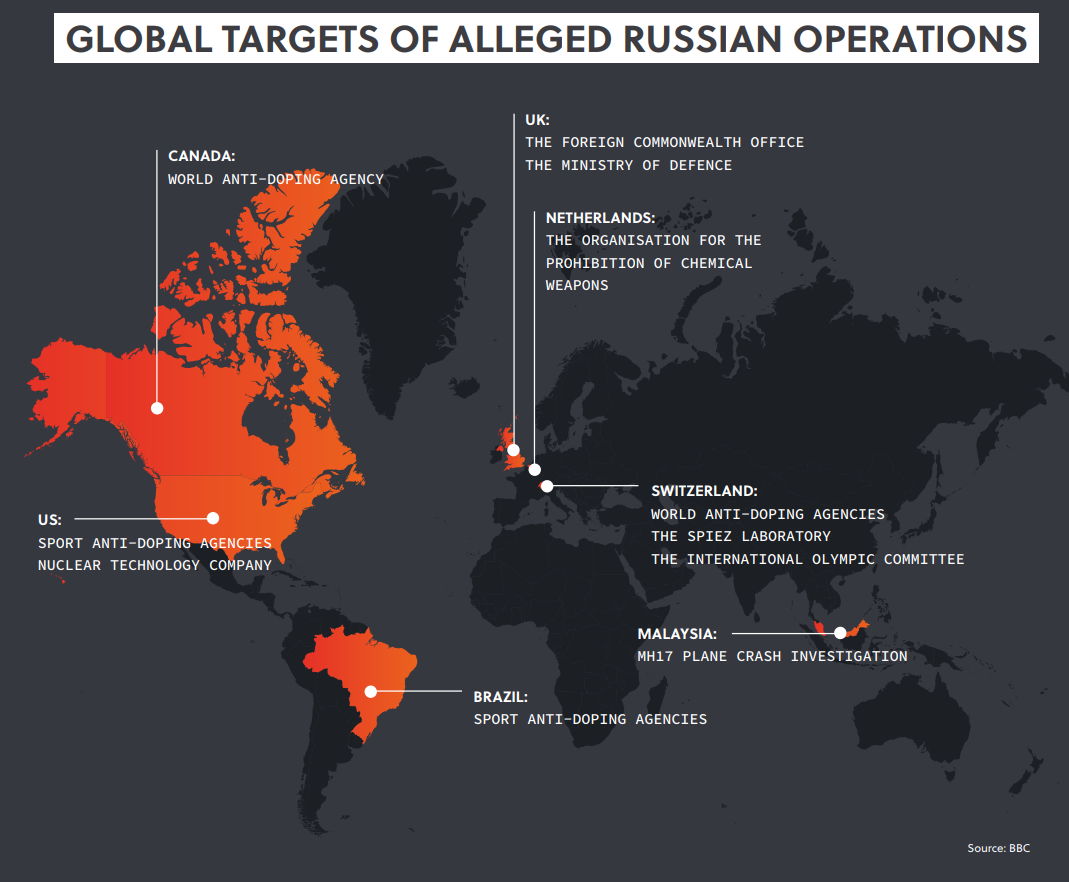Caught Red-Handed: The European Response to Russian Espionage

On 4 October 2018, Dutch Prime Minister, Mark Rutte, and his British counterpart, Theresa May, stated that Russia’s military intelligence unit had tried to stage a cyber-attack targeting the Organisation for the Prohibition of Chemical Weapons (OPCW) in The Hague. According to Dutch officials, four Russian military intelligence officials from the Glavnoje Razvedyvatel’noje Upravlenije (Main Intelligence Directorate, GRU), one of Russia’s three main intelligence agencies, travelled to the Netherlands on 10 April using Russian diplomatic passports. The operatives, including two technology experts and two support agents, hired a rental vehicle with the assistance of a Russian embassy official and, on 12 and 13 April, positioned it inside the parking lot of the Marriott Hotel, adjacent to the OPCW building in The Hague. Inside the vehicle was highly sophisticated equipment designed to hack and intercept data transmitted by Wi-Fi channels, specifically intended to acquire login details of key OPCW personnel.
The operatives had also purchased tickets to travel from the Dutch city of Utrecht to Switzerland, in an alleged plan to conduct a similar operation outside the OPCW-accredited Swiss laboratory in Spiez, Bern. At the time, OPCW officials at the Spiez laboratory were investigating samples from the nerve agent attack in March on Sergei and Yulia Skripal in Salisbury, England. The likely intention of the operation was to gather information regarding the status of the OPCW investigations into Russian state-sponsored chemical weapons usage. Dutch intelligence officials detained all four Russian operatives during the operation in The Hague, and local authorities subsequently expelled them from the country. Russia’s Foreign Ministry spokesperson, Maria Zakharova, rejected the accusations as a “diabolical perfume cocktail” of disinformation, and denied the individuals are linked to Russia’s GRU, despite strong evidence to the contrary
Russia has recently been implicated in a series of high profile foreign intelligence operations, further contributing to political tensions between Russia and key European countries and institutions.
POLITICAL TENSIONS
Russia has recently been implicated in a series of high profile foreign intelligence operations. This latest incident has further contributed to political tensions between Russia and key European countries and institutions. Shortly after the statement by the Dutch and British prime ministers, European Council President Donald Tusk, alongside European Commission President Jean-Claude Juncker, and EU Foreign Policy chief Federica Mogherini issued a separate statement condemning the attempted cyber-attack.
Nevertheless, in a European Council meeting on 18 October, European leaders hesitated to act in response to Russia’s espionage operations on the continent. Several heads of state reiterated previous statements denouncing Russia’s aggressive cyber-attacks, but ultimately decided against implementing further sanctions targeting the country. The UK and the Netherlands led a group of eight countries which called for new cyber sanctions to be developed, and for Russia to be specifically called out for carrying out cyber-attacks. However, France and Italy refused to support the initiative. Italy, alongside France, Austria and Cyprus, believe implementing a fresh round of economic sanctions will negatively impact the European economy. Italy’s position has been particularly conciliatory toward Russia and, on 25 October, Italy’s Prime Minister Giuseppe Conte indicated that Italy may veto the renewal of prior sanctions – imposed by the EU after Russia annexed Crimea in 2014 – at an EU summit in Brussels in December.
Furthermore, while Russian espionage operations in Europe have undoubtedly placed strain on Russia’s relations with the continent, it is highly likely that any action by Europe would be further restrained by Europe’s continued reliance on Russian natural gas. In 2017, Russia supplied nearly 40 percent of Europe’s total gas consumption, while the Nord Stream 2 project, which is expected to double Russian gas supplies to Germany, is perceived as too strategically important to jeopardise. Thus, in Germany, high ranking politicians continue to resist the idea of sanctions that may affect the energy sector, due to the potential domestic political fallout. A large number of European companies have substantial interests in the Russian energy sector, and the successful completion of the Nord Stream 2 project is seen as necessary for continued industrial growth in Germany’s manufacturing sector.

SANCTIONS AND REPUTATIONS
The EU Council’s recalcitrance to implement a special sanctions regime in response to Russia’s attempted cyber-attack against OPCW may, for the moment, mute some of the concerns of commercial operators with cross-regional interests. However, such concerns should not be entirely cast aside, with the US recently displaying no such qualms in imposing more sanctions on Russia.
On 6 April, and again on 11 June, the US imposed fresh rounds of sanctions on Russia, the former for interfering in the 2016 elections, and the latter as a response to Russian cyberwarfare. In both instances, the sanctions were targeted at companies and individuals, including businesspersons and government officials. These targeted sanctions attempted to shield the impact from the broader Russian population. However, several large Western companies were negatively impacted by the decision. For example, Glencore, the Anglo-Swiss multinational commodity trading and mining company, announced on 10 April that its Chief Executive, Ivan Glasenberg, had resigned as a director of Rusal, the Russian aluminium company owned by Oleg Deripaska, a Russian oligarch specifically targeted by US sanctions. Glencore held just under nine percent of Rusal, whose share-price fell more than 50 percent amid investor concerns over the impact of US sanctions.
Commercial operators also face reputational concerns arising from relationships with Russian businesses, where firms or individuals are targeted by sanctions. For example, on 9 April 2018, Swiss engineering company, Sulzer AG, agreed to buy back shares from Renova Holdings, a holding company with energy sector interests, and a target of the new sanctions, after it stated that the re-purchase would “assuage” concerns about the company’s independence. Of particular concern was its relationship with the head of Renova Group, Viktor Vekselberg, who was specifically named in the US Treasury Department’s sanctions list.
CONCLUSION
While the GRU’s attempt to hack the OPCW’s facilities in The Hague have increased political tensions with European states, given the competing interests within the European block of countries, the political fallout has not prompted a new economic sanctions regime as yet. Nonetheless, Russia’s readiness to engage in a variety of often brazen intelligence operations abroad puts the prospect of future sanctions firmly on the table. As such, while Europe remains restrained for now, businesses and businesspeople alike need be concerned should Russia choose to test the limits of European tolerance when it comes to responding to acts of espionage.
